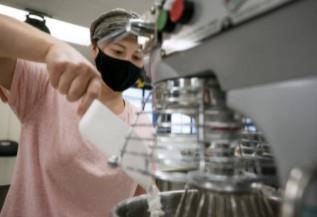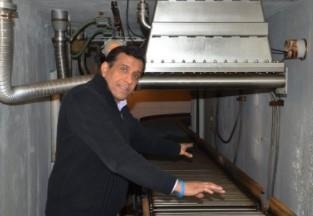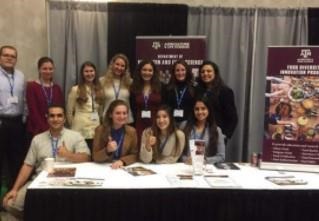Fewer agricultural producers, challenging environmental conditions, rising input costs, supply chain disruptions and other factors have made food science and technology a high-demand career. They are also vital to ensuring a safe and sustainable food supply for an increasing population.

Food science and technology incorporates biological, physical and engineering sciences. (Texas A&M AgriLife photo by Laura McKenzie)
“The goal of the Department of Food Science and Technology at Texas A&M University is to be a premier, world-class training, research and educational outreach program that will help shape the future of food science and offer modern and novel solutions to the challenges related to food quality, safety and security,” said department head Joseph Awika, Ph.D.
The department is in Texas A&M’s College of Agriculture and Life Sciences, Bryan-College Station.
Awika said students who choose food science as their educational path gain knowledge in biological, physical and engineering sciences and their application to meet evolving consumer dietary needs.
What is food science and technology?
“Food science and technology is an exciting multidisciplinary field that applies science and engineering principles to provide safe, nutritious and wholesome foods to consumers,” Awika said. “Through its graduate and undergraduate programs, students learn about developing new food products, designing innovative processing technologies and improving food safety as well as quality and nutritive value.”
Graduates have found careers in a diverse number of areas, including research and development, quality assurance, technical sales, sensory science and academia, he said.
“Our faculty are dedicated to research, teaching and educational outreach to meet consumer and industry needs and challenges locally, nationally and globally,” Awika said. “This gives our students a competitive edge in the job market in addition to helping make them more well-prepared global citizens.”
Department facilities

Suresh Pillai, Ph.D. and eBeam chamber. (Texas A&M AgriLife photo)
“We work closely with government, academic and industry scientists to be responsive to their needs,” said Suresh Pillai, Ph.D., professor and Texas A&M AgriLife Research Faculty Fellow in the Department of Food Science and Technology. Pillai oversees the department’s National Center for Electron Beam Research on the Texas A&M campus.
“Our faculty research labs and departmental core facilities provide exceptional undergraduate and graduate student training,” he said.
Some of the laboratory facilities and research efforts of the department include:
- The National Center for Electron Beam Research – Focusing on molecular food safety and environmental microbiology, including the use of electron beam technology for various applications.
- The Vegetable and Fruit improvement Center – Investigating pre- and post-harvest effects of bioactive compounds in citrus fruits, vegetables and spices.
- The Cereal Quality Lab — Conducting research in cereal science, carbohydrate chemistry, polyphenol-food polymer interactions, bioactive compounds chemistry, and international food and nutrition security research.
- A pilot-scale high acid/hot-fill processing bottling line for high-impact student training and collaborative research and development with the food industry.
- An advanced analytical laboratory for food properties characterization.
Areas of excellence in research
The four areas of excellence in research identified as essential to supporting the departmental strategic direction are:

The Food Diversity Innovation Program focuses on learning about religious, ethnic and other certified foods through direct interaction with those involved in food industry research and development. (Texas A&M AgriLife photo)
- Global food safety and quality.
- Functional food systems for improved health.
- Innovative technologies.
- Global sensory and consumer science.
Faculty research areas include microbial food safety, food chemistry, process technologies, food biochemical properties, bioactive compounds and human health, and international food and nutrition security.
In 2016, the department initiated the Food Diversity Innovation Program, a high-impact educational and research program in the specialized areas of religious, ethnic and other certified foods.
This program educates graduate and undergraduate students through direct interactions with food industries and hands-on research and product development experiences. It also offers a food diversity certificate that includes 15 hours of concentrated study in religious and ethnic foods related to food processing, quality control, record keeping and global certifications.
“In the future, food science and technology will play an even greater role in addressing the needs of consumers and the food industry by innovating to ensure a safe, healthy and wholesome food supply within a sustainable framework,” Awika said. “Our goal is to make sure our students are fully prepared to meet the challenges of the future.”
Source : tamu.edu